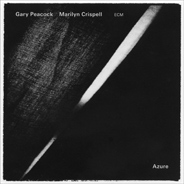
Gary
Peacock/Marilyn Crispell
Azure
(ECM)
What a great surprise is to find Marilyn Crispell’s piano deep in conversation with Gary Peacock’s double bass, just when I had become
totally convinced that their roads would never meet again, with Gary
Peacock busy playing in the acclaimed Trio with Keith Jarrett and Jack
DeJohnette, and Marilyn Crispell being always faithful to her inner calling,
which has proved to be artistically fecund while at the same time keeping
her far from the commercial spotlight.
The drum set of the late, great Paul Motian had completed the trio on Crispell’s
ECM debut. While revisiting the music composed by Annette Peacock, the
album titled Nothing Ever Was, Anyway (1997) also appeared as a meditation
on Paul Bley’s concept of the piano – though it has to be said that Crispell
herself, in her liner notes to Amaryllis (2001), the acclaimed follow-up
to Nothing Ever Was, Anyway, had written that "(…)
"for me, the revelation of the session came when Manfred" (Eicher)
"suggested that we play some slow free pieces". (…) "The
revelation of this music somehow was that freedom is not a concept that can
be reserved for any one particular style of improvised music."
Then, the trio had seen its personality change, Mark Helias taking Peacock’s bass chair on the great album titled Storyteller
(2003).
To anticipate my conclusion, I’ll say that Azure is an album that never disappoints.
Very well recorded, by the way, it shows the double bass loud and clear:
we’re long past those times when the sound of the acoustic four-string
appeared to come from a different county, or just disappeared inside vinyl’s
noise floor; we are also well past the stage when the double bass was supposed
to "comp".
Compositions and improvisations are shared equally, and there are also two
solo pieces, titled – you’ll never guess it – Bass Solo and Piano
Solo: dense, intense, both say a lot in a short time, something which also
could be said of all the album tracks, which appear to be quite longer
than their (written) duration.
Album
opener is a Crispell composition titled Patterns. It’s a theme that in
a way reminded me of some piano explorations by Muhal Richard Abrams, especially
so the second time the theme is stated, at about 6′., the track near to
its close. The piece develops in a dialogic way, quite controlled. There’s
a fine, long,
"swinging" moment from the double bass, the piano acting as counterpoint.
The double bass, solo, brings the piece to its close. A bit strange, the
first track is maybe the most difficult, also dark-sounding, of the whole
CD: this is a pragmatic consideration which I’m sure is quite alien to the
artistic vision of all great musicians, but I’ll invite readers who are not
used to those climates not to abandon their listening exploration, going
on to track #2.
Goodbye
– Crispell again – is a great "ballad": just like with the parting
of the clouds, the sun appears. Here the sound is clearer – which doesn’t
imply that the material is any easier: it took me a while to notice that
what at first had sounded to me like a "comp" bass part to a
piano solo was in fact a written part where bass parts were later "echoed" by
the piano.
By Peacock/Crispell, Leapfrog is "jumpy" as per its title, with
a dense development.
Waltz
After David M, by Crispell, is a "jazzy" piece that’s quite accessible.
After an intro that I’ll call "à la Paul Bley", there’s a fine
theme that would also be perfect when performed on accordion. There’s a
fine piano performance, book-ending a long bass solo.
Lullaby,
by Peacock, has a complex theme: after a chord sequence from the piano,
there’s a melodic phrase from the double bass, then a passage played unison
(which to my "rock" ears sounded quite Hopper-like), then repeated.
There’s a double bass solo with piano backing, playing chords, then a piano
solo. It’s a fine composition, dunno about the title.
The
Lea, by Peacock, is brief but with substance. It opens for solo bass, then
the theme is performed on piano, then it’s time for some bass variations.
Penned
by Peacock/Crispell, Blue is the most "jazzy"-sounding,
"swinging", piece, maybe what one would normally expect from a
"jazz duo album"? Great economy of means, and what’s that, maybe
a pinch of Blue Note from the 60s?
Puppets,
by Peacock, opens for piano, then there’s a long episode with bass played
arco, quite cello-like (Paul Chambers? Richard Davis?). A slide on a bass
note signals the start of a brief piano part, the end.
Closing
track Azure, by Peacock/Crispell, is an airy, placid, "ballad".
Arpeggios that take their time, both instruments traveling parallel.
"Tremolo" for two hands, pedal.
Beppe
Colli
© Beppe Colli 2013
CloudsandClocks.net
| June 26, 2013


